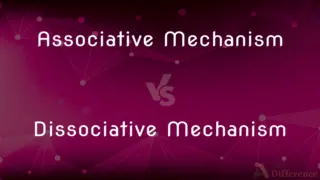Lunar Eclipse vs. Solar Eclipse — What's the Difference?
Edited by Tayyaba Rehman — By Fiza Rafique — Published on November 24, 2023
A Lunar Eclipse occurs when Earth's shadow falls on the Moon; a Solar Eclipse happens when the Moon's shadow falls on Earth.

Difference Between Lunar Eclipse and Solar Eclipse
Table of Contents
ADVERTISEMENT
Key Differences
In a Lunar Eclipse, the Earth positions itself between the Sun and the Moon, causing Earth's shadow to obscure the Moon or a portion of it. During a Solar Eclipse, the Moon aligns between the Earth and the Sun, casting a shadow that either partially or entirely blocks the Sun from view on Earth.
A Lunar Eclipse is safe to view with the naked eye, as observers are simply looking at the Moon being shadowed by the Earth. However, during a Solar Eclipse, looking directly at the Sun can cause serious eye damage, thus requiring protective measures or special glasses.
Lunar Eclipses are more common and can be seen from anywhere on the nighttime side of the Earth. Conversely, Solar Eclipses are rarer and can only be viewed from specific areas on Earth where the Moon's shadow falls.
The three types of Lunar Eclipses are: penumbral, partial, and total. In a Solar Eclipse, the classifications are partial, total, annular, and hybrid.
Both Lunar and Solar Eclipses have been subjects of fascination and study for centuries. Cultures around the world have developed myths and legends surrounding these celestial events, often viewing them as powerful omens.
ADVERTISEMENT
Comparison Chart
Cause
Earth's shadow on the Moon.
Moon's shadow on Earth.
Visibility
Anywhere on the nighttime side of Earth.
Specific areas where shadow falls.
Frequency
More common.
Less common.
Eye Safety
Safe to view directly.
Requires protection to view directly.
Types
Penumbral, partial, total.
Partial, total, annular, hybrid.
Compare with Definitions
Lunar Eclipse
The phenomenon when the Moon passes through Earth's shadow.
I set up my telescope to observe the Lunar Eclipse.
Solar Eclipse
The phenomenon when the Sun is partially or fully blocked by the Moon.
During the Solar Eclipse, day turned into night momentarily.
Lunar Eclipse
The event where the Moon is obscured as it passes Earth's umbra.
Ancient cultures had various myths surrounding the Lunar Eclipse.
Solar Eclipse
The event marked by the Moon's passage between the Earth and the Sun.
Solar Eclipses have been considered omens in many cultures.
Lunar Eclipse
A celestial event where the Earth aligns between the Sun and the Moon.
During the Lunar Eclipse, the Moon took on a reddish hue.
Solar Eclipse
A celestial event where the Moon aligns between the Earth and the Sun.
The Solar Eclipse lasted only a few minutes but was memorable.
Lunar Eclipse
An eclipse involving the Moon becoming dim or reddish.
The Lunar Eclipse is a reminder of our place in the cosmos.
Solar Eclipse
The obscuring of the Sun by the Moon's shadow on Earth.
We traveled to the path of totality to see the Solar Eclipse.
Lunar Eclipse
The obscuring of the Moon by Earth's shadow.
Last night's Lunar Eclipse was breathtaking.
Solar Eclipse
An eclipse involving the Sun getting obscured from view on Earth.
We wore special glasses to safely view the Solar Eclipse.
Common Curiosities
Is it safe to look directly at a Lunar Eclipse?
Yes, it's safe to directly observe a Lunar Eclipse with the naked eye.
Why do we need special glasses for a Solar Eclipse?
Special glasses are needed for a Solar Eclipse to protect eyes from the Sun's intense rays, which can cause damage.
Are Solar Eclipses considered rare?
Total Solar Eclipses are relatively rare, occurring approximately once every 18 months somewhere on Earth.
How is a Solar Eclipse different from a Lunar Eclipse?
In a Solar Eclipse, the Moon's shadow falls on Earth, obscuring the Sun, whereas in a Lunar Eclipse, Earth's shadow falls on the Moon.
Why does the Moon appear red during some Lunar Eclipses?
The red appearance, often called a "blood moon," is due to Earth's atmosphere scattering sunlight and allowing only the longer-wavelength red light to reach and illuminate the Moon.
What is the umbra in the context of a Lunar Eclipse?
The umbra is the darkest part of Earth's shadow where the Sun's light is completely blocked.
Which lasts longer, a Lunar or Solar Eclipse?
Typically, a Lunar Eclipse lasts longer than a Solar Eclipse.
What causes a Lunar Eclipse?
A Lunar Eclipse occurs when the Earth's shadow falls on the Moon.
How is an annular Solar Eclipse different from a total Solar Eclipse?
In an annular Solar Eclipse, the Moon doesn't completely cover the Sun, leaving a ring-like appearance called the "ring of fire." In a total Solar Eclipse, the Sun is completely obscured.
Do Lunar Eclipses affect Earth's tides?
While the Sun and Moon's alignment during a Lunar Eclipse can lead to slightly higher tides, known as "king tides," the effect is minimal.
How often do Lunar Eclipses occur?
Lunar Eclipses occur more frequently than Solar Eclipses, with several happening each year.
Can Solar Eclipses happen every month during the new moon phase?
No, Solar Eclipses don't happen every new moon due to the tilt of the Moon's orbit around Earth.
Why don't we experience a Solar Eclipse every new moon?
The Moon's orbit is tilted relative to Earth's orbit, so they don't always align perfectly every new moon to produce a Solar Eclipse.
Can everyone on Earth see a Lunar Eclipse?
A Lunar Eclipse can be seen by anyone on the nighttime side of Earth when it occurs.
What's the rarest type of Solar Eclipse?
The hybrid Solar Eclipse, which shifts between total and annular during its passage, is the rarest type.
Share Your Discovery

Previous Comparison
Pyruvate vs. Pyruvic Acid
Next Comparison
Associative Mechanism vs. Dissociative MechanismAuthor Spotlight
Written by
Fiza RafiqueFiza Rafique is a skilled content writer at AskDifference.com, where she meticulously refines and enhances written pieces. Drawing from her vast editorial expertise, Fiza ensures clarity, accuracy, and precision in every article. Passionate about language, she continually seeks to elevate the quality of content for readers worldwide.
Edited by
Tayyaba RehmanTayyaba Rehman is a distinguished writer, currently serving as a primary contributor to askdifference.com. As a researcher in semantics and etymology, Tayyaba's passion for the complexity of languages and their distinctions has found a perfect home on the platform. Tayyaba delves into the intricacies of language, distinguishing between commonly confused words and phrases, thereby providing clarity for readers worldwide.











































